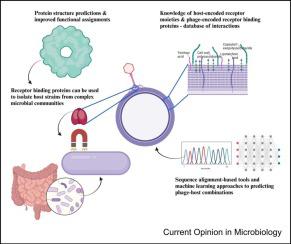Current Opinion in Microbiology ( IF 5.4 ) Pub Date : 2024-01-20 , DOI: 10.1016/j.mib.2024.102426 Jennifer Mahony

|
The field of microbial ecology has been transformed by metagenomics in recent decades and has culminated in vast datasets that facilitate the bioinformatic dissection of complex microbial communities. Recently, attention has turned from defining the microbiota composition to the interactions and relationships that occur between members of the microbiota. Within complex microbiota, the identification of bacteriophage–host combinations has been a major challenge. Recent developments in artificial intelligence tools to predict protein structure and function as well as the relationships between bacteria and their infecting bacteriophages allow a strategic approach to identifying and validating phage–host relationships. However, biological validation of these predictions remains essential and will serve to improve the existing predictive tools. In this review, I provide an overview of the most recent developments in both bioinformatic and experimental approaches to predicting and experimentally validating unknown phage–host combinations.
中文翻译:

用于发现未知噬菌体-宿主组合的生物学和生物信息工具
近几十年来,宏基因组学改变了微生物生态学领域,并最终形成了大量数据集,有助于对复杂微生物群落进行生物信息学剖析。最近,人们的注意力已从定义微生物群组成转向微生物群成员之间发生的相互作用和关系。在复杂的微生物群中,噬菌体-宿主组合的鉴定一直是一个重大挑战。人工智能工具的最新发展可预测蛋白质结构和功能以及细菌与其感染噬菌体之间的关系,为识别和验证噬菌体-宿主关系提供了一种战略方法。然而,这些预测的生物学验证仍然至关重要,并将有助于改进现有的预测工具。在这篇综述中,我概述了预测和实验验证未知噬菌体-宿主组合的生物信息学和实验方法的最新进展。



























 京公网安备 11010802027423号
京公网安备 11010802027423号